
Wesley Lee Fox was a highly decorated United States Marine Corps colonel with 43 years of service. Fox was a combat veteran – receiving the Medal of Honor for his heroic actions during the Vietnam War – and is considered one of the Marine Corps' legendary heroes. After retiring from the Marine Corps, he wrote a book about his career: Marine Rifleman: Forty-Three Years in the Corps; and, he served for 8 years as deputy commandant for the Virginia Tech Corps of Cadets.
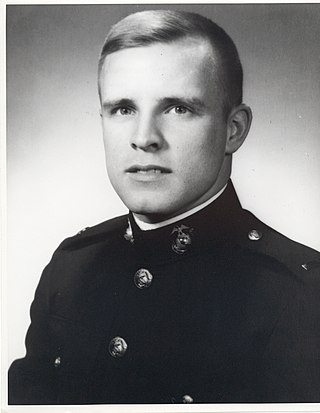
Terrence Collinson Graves was a United States Marine Corps officer who was posthumously awarded the Medal of Honor for his "outstanding courage, superb leadership and indomitable fighting spirit" on 16 February 1968, during the Vietnam War.

Allan Jay Kellogg Jr. is a retired sergeant major in the United States Marine Corps. He received the United States military's highest decoration, the Medal of Honor, for his actions as a staff sergeant on March 11, 1970, during the Vietnam War.

The 3rd Reconnaissance Battalion conducts amphibious and ground reconnaissance in support of the 3rd Marine Division and Marine Forces Pacific (MarForPac), operating in the commander's areas of influence. The battalion is based out of Camp Schwab, a satellite base of Marine Corps Base Camp Smedley D. Butler. It is geographically located on the Okinawa Prefecture in Japan.
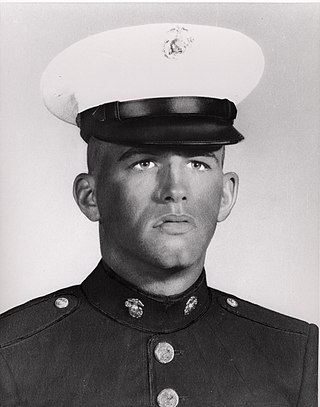
Lance Corporal Richard Allen Anderson was a United States Marine who was posthumously awarded the Medal of Honor for his heroic actions above and beyond the call of duty in August 1969 during the Vietnam War.

Harvey Curtiss Barnum Jr. is a retired United States Marine Corps officer who received the Medal of Honor during the Vietnam War. He was the fourth Marine to receive the medal for actions in Vietnam. He retired from the Marine Corps in 1989 after more than 27 years of service. Barnum served as Deputy Assistant Secretary of the Navy for Reserve Affairs from July 23, 2001, to January 20, 2008. He also served as Acting Assistant Secretary of the Navy from January 21 to April 30, 2009.

John Paul Bobo was a United States Marine Corps second lieutenant who posthumously received the Medal of Honor for heroism during the Vietnam War on March 30, 1967.

Major General James Lewis Day was a United States Marine Corps major general who served in World War II, in the Korean War, and in the Vietnam War. He was awarded the Medal of Honor for his heroic actions as a corporal on May 14 to 17, 1945 during the Battle of Okinawa in World War II.

Private First Class Douglas Eugene Dickey was a United States Marine who posthumously received the Medal of Honor for heroism during Operation Beacon Hill 1, on March 26, 1967, while serving as a rifleman with Company C, 1st Battalion, 4th Marines, 9th Marine Amphibious Brigade, 3rd Marine Division, in the Republic of Vietnam.

Robert Henry Jenkins Jr. was a United States Marine who was awarded the Medal of Honor posthumously for his heroic actions above and beyond the call of duty in March 1969 during the Vietnam War.
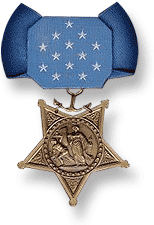
Ralph Henry Johnson was a United States Marine who posthumously received the Medal of Honor for heroism in March 1968 during the Vietnam War. When a hand grenade was thrown into his fighting hole, he immediately covered it with his body—absorbing the full impact of the blast—sacrificing his life to save a fellow Marine and preventing the enemy from penetrating his patrol perimeter.
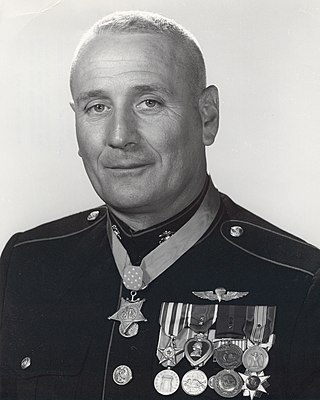
Jimmie Earl Howard was a Marine Corps staff sergeant when he led an eighteen-man reconnaissance patrol in a fierce battle against a battalion of Viet Cong in June 1966. As a result of his heroic actions, Howard became the sixth U.S. Marine to be awarded the nation's highest honor for heroism in combat in Vietnam. The Medal of Honor was presented by President Lyndon B. Johnson in White House ceremonies on August 21, 1967.

Lieutenant Colonel Howard Vincent Lee was a United States Marine Corps officer who received the Medal of Honor for heroism in August 1966 during the Vietnam War.
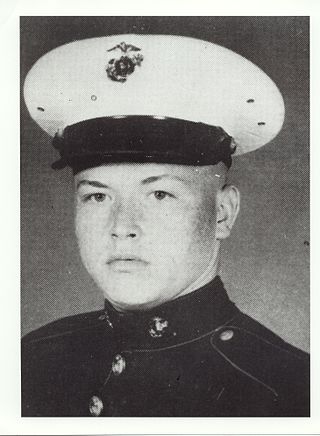
Lance Corporal Joe Calvin Paul was a United States Marine killed in the Vietnam War who posthumously received the Medal of Honor for diverting an attack long enough to allow the evacuation of wounded Marines during Operation Starlite near Chu Lai, Vietnam, on August 18, 1965. The medal was awarded on February 7, 1967, during a ceremony in the Office of Secretary of the Navy Paul H. Nitze, who presented the award to his parents.

Captain John James McGinty III was a United States Marine Corps officer who received the United States militaries' highest decoration — the Medal of Honor — for heroism during July 1966 in the Vietnam War.

Robert Joseph Modrzejewski is a retired United States Marine Corps officer who is a recipient of the United States' highest military decoration, the Medal of Honor, for conspicuous gallantry in the Vietnam War.

Robert Emmett O'Malley is a United States Marine veteran who was the first Marine Corps recipient of the Medal of Honor in the Vietnam War. He received the medal for his actions as a corporal on August 18, 1965, during Operation Starlite.

William Groom Leftwich Jr. was an officer of the United States Marine Corps who served during the Vietnam War. In 1970, he was killed in a helicopter crash during a combat mission in the Vietnam War.

Major General Wayne Evan Rollings, USMC, was Commanding General, II Marine Expeditionary Force, III Marine Expeditionary Force and a recipient of the Navy Cross.

Ricardo Courtney Binns (R.C.Binns) was a corporal in the United States Marine Corps and a recipient of the Navy Cross for actions in the Battle of Hill 488 of the Vietnam War. Later in life he became an author. Using the name he was most commonly known by, R. C. Binns, he wrote "We Are Not Warmongers", and The Price of Glory: "Battle of Hill 488".





















